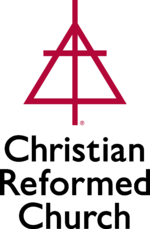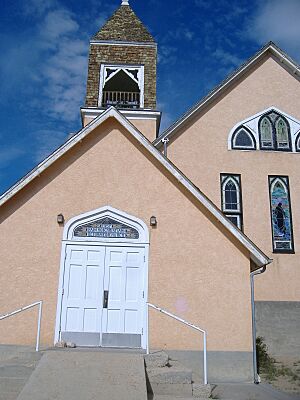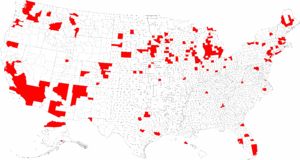Christian Reformed Church in North America facts for kids
Quick facts for kids Christian Reformed Church in North America |
|
|---|---|

Official Logo of the Christian Reformed Church
|
|
| Abbreviation | CRCNA or CRC |
| Classification | Protestant |
| Orientation | Evangelical Calvinist |
| Theology | Reformed |
| Polity | Modified-Presbyterian |
| Associations | World Reformed Fellowship |
| Region | United States, Canada |
| Headquarters | Grand Rapids, Michigan and Burlington, Ontario |
| Origin | 1857 Holland, Michigan |
| Separated from | Founded by Dutch immigrants; split from the Reformed Church in America |
| Branched from | Dutch Reformed Church |
| Separations | 1924–26 Protestant Reformed Churches; 1988 Orthodox Christian Reformed Churches; 1996 United Reformed Churches in North America |
| Congregations | 1,000 (2024) |
| Members | 189,753 (2024) |
The Christian Reformed Church in North America (often called CRCNA or CRC) is a type of Christian church found in the United States and Canada. It is part of the Protestant faith and follows Calvinism, a specific way of understanding Christian beliefs. The CRCNA was started in 1857 by people who had moved from the Netherlands.
Contents
History of the CRCNA
The Christian Reformed Church began when some people left the Reformed Church in America in 1857. This happened because of disagreements over certain beliefs and practices. The leader of this group was Gijsbert Haan. He helped create the Christian Reformed Church in North America.
In 1857, four churches with about 130 families decided to leave. They felt the Reformed Church in America had problems, similar to issues they had seen in their home country. These early members came from different parts of the Netherlands.
Some of the main reasons for leaving included:
- Using hymns in worship instead of only psalms.
- Allowing everyone to take communion freely.
- Different ideas about God's grace.
- Allowing members to join groups like Freemasonry.
- Not teaching young people enough about their faith.
For the first two years, the new church didn't have a formal name. Over time, its name changed several times. It was called the "Holland Reformed Church" in 1859. Later, it became the "True Dutch Reformed Church." In 1880, it was named the "Holland Christian Reformed Church." Finally, in 1904, it became the "Christian Reformed Church." In 1974, the name was updated to the "Christian Reformed Church in North America."
In 1875, the church opened a school in Grand Rapids, Michigan. This school later grew into Calvin University and Calvin Theological Seminary. By 1880, the church had 42 congregations. Ten years later, it had grown to 100 churches across 11 states.
By 1920, the CRCNA had about 350 churches. Many Dutch immigrants came to the United States around this time. A Dutch theologian and statesman named Abraham Kuyper greatly influenced the church's thinking. He believed Christians should work to improve all parts of society.
In the 1920s, there was another disagreement within the CRCNA about certain beliefs. This led to some ministers and their followers leaving to form a new group called the Protestant Reformed Churches in America.
After World War II, many Dutch Calvinists moved to Canada. By 1960, a large number of the CRCNA's new churches were in Canada. In 1961, another group, the Orthodox Protestant Reformed Church, joined the CRCNA.
Working with Other Churches
Since 1975, the CRCNA has worked with other Reformed and Presbyterian churches in North America. This group is called the North American Presbyterian and Reformed Council (NAPARC).
However, in the late 1900s, the CRCNA made some changes that some members and other churches disagreed with. For example, in 1995, the CRCNA decided to allow women to become pastors. This decision caused some groups to leave the CRCNA. It also led to other churches ending their partnerships with the CRCNA. Because of this, NAPARC removed the CRCNA from its membership in 2001.
The CRCNA was also a founding member of the Reformed Ecumenical Council in 1946. In 2010, this council merged with another group to form the World Communion of Reformed Churches. The CRCNA is also part of other Christian groups in Canada and the United States. It works with 39 different church groups around the world.
What the CRCNA Believes
The Christian Reformed Church follows Calvinism. It believes that God's gift of salvation cannot be earned by people, but is freely given. Good actions are seen as a way for Christians to show thanks for this gift.
The church values studying the Bible and applying its teachings to modern life. It also respects the personal beliefs of its members.
A very important thinker for the CRCNA was Abraham Kuyper. He believed that Christians should be active in society and work to make all parts of life better. He is also seen as a founder of the idea of Christian Democracy in politics. Many famous thinkers and writers, like philosophers Alvin Plantinga and Nicholas Wolterstorff, are connected to the CRCNA and Calvin University.
Important Beliefs and Statements
The CRCNA officially follows several old and important Christian statements of faith. These include:
- The Apostles' Creed
- The Nicene Creed
- The Athanasian Creed
It also follows three Reformed statements, known as the Three Forms of Unity:
- The Belgic Confession
- The Heidelberg Catechism
- The Canons of Dort
In 1986, the CRCNA wrote a modern statement of faith called "Our World Belongs to God: A Contemporary Testimony." This statement talks about challenges of faith in today's world, like secularism and individualism. It helps express CRCNA beliefs in a way that connects with current issues. This statement was updated in 2008. Another important statement for the CRCNA is the Belhar Confession, which came from Reformed churches in South Africa.
Working for Social Justice
The CRCNA encourages its members to work for social justice. It has offices that focus on these issues in both Canada and the United States. The church takes clear stands on many important topics, including:
- Fair immigration laws.
- Ending poverty and hunger around the world.
- Fighting racism.
- Seeking justice for Indigenous groups.
- Protecting God's creation and addressing climate change.
- Helping refugees.
- Supporting those who are treated unfairly because of their faith.
Missions Around the World
The CRCNA has mission efforts in many places, including Nigeria, South America, Southeast Asia, and the Navajo Reservation in the United States.
On the Navajo reservation, two well-known missions are Zuni and Rehoboth. Rehoboth was started in 1903. It has grown into a large church and runs an independent school for over 500 students from kindergarten to high school. The first Rehoboth church building was built in 1908, and the congregation moved to a new building in 2005.
How the Church is Organized
The CRCNA is organized in a "Presbyterian" way. This means it is led by elders. Unlike some other churches, elders and deacons in the CRCNA serve for specific terms, not forever. Also, ministers are approved by their local church, not a larger regional group.
The CRCNA has three main levels of organization:
- Church Council: This is the local group that leads each church. It includes deacons, elders, and ministers.
- Classis: This is a regional group of churches. There are 48 classes in total, mostly in the United States and Canada.
- Synod: This is the main, bi-national meeting for the whole church. It meets every June with 192 representatives from all the classes.
The main offices for the church are in Grand Rapids, Michigan, and Burlington, Ontario. The CRCNA has sent missionaries to many countries, and these new churches have become independent.
Education and Agencies
The Christian Reformed Church believes education is very important. Many members support Christian schools and colleges.
The church owns and supports Calvin University and Calvin Theological Seminary in Grand Rapids, Michigan. Most ministers in the CRCNA train at Calvin Seminary. Other colleges connected to the church include Kuyper College, Trinity Christian College, Dordt University, Redeemer University College, and The King's University.
Elim Christian Services in Illinois is a school for students with special needs, also connected to the CRCNA.
Church Agencies
The CRCNA has several agencies that help carry out its work:
- Back to God Ministries International: This group uses media like radio, TV, and the internet to share Christian messages in many languages around the world.
- Calvin University: This is the oldest and main college of the CRCNA.
- Calvin Theological Seminary: This seminary trains ministers and others for church work.
- Resonate Global Mission: This group trains leaders, helps start new churches, and partners with others to share the good news of Jesus Christ worldwide.
- World Renew: This is the church's relief and development organization. It helps people suffering from poverty, hunger, disasters, and injustice around the world.
Departments and Offices
The CRCNA also has various departments and offices that manage specific areas of its work, such as:
- Faith Alive Christian Resources: Publishes books and learning materials.
- Canadian Ministries: Focuses on church work in Canada.
- Chaplaincy & Care Ministry: Supports chaplains and provides care.
- Office of Social Justice: Works on social justice issues.
- Race Relations: Focuses on improving race relations.
- Safe Church: Works to make churches safe for everyone.
Related Agencies
Some other organizations are closely connected to the CRCNA, including:
- Diaconal Ministries Canada
- Dynamic Youth Ministries: Works with young people, including groups like Calvinist Cadet Corps and GEMS Girls' Clubs.
- Friendship Ministries
- Partners Worldwide
Church Membership
| Year | Members | Churches |
|---|---|---|
| 1963 | 256,015 | 585 |
| 1964 | 263,178 | 597 |
| 1965 | 268,165 | 610 |
| 1966 | 272,461 | 624 |
| 1967 | 275,530 | 629 |
| 1968 | 278,869 | 634 |
| 1969 | 281,523 | 648 |
| 1970 | 284,737 | 658 |
| 1971 | 285,628 | 660 |
| 1972 | 286,094 | 674 |
| 1973 | 287,114 | 750 |
| 1974 | 287,553 | 763 |
| 1975 | 286,371 | 688 |
| 1976 | 287,503 | 695 |
| 1977 | 288,024 | 706 |
| 1978 | 287,656 | 791 |
| 1979 | 289,011 | 814 |
| 1980 | 292,379 | 828 |
| 1981 | 294,354 | 824 |
| 1982 | 296,706 | 828 |
| 1983 | 299,685 | 828 |
| 1984 | 302,436 | 838 |
| 1985 | 305,228 | 853 |
| 1986 | 306,309 | 959 |
| 1987 | 308,993 | 876 |
| 1988 | 310,160 | 891 |
| 1989 | 310,014 | 903 |
| 1990 | 314,226 | 941 |
| 1991 | 315,086 | 958 |
| 1992 | 316,415 | 981 |
| 1993 | 311,202 | 979 |
| 1994 | 300,320 | 979 |
| 1995 | 294,179 | 985 |
| 1996 | 291,796 | 991 |
| 1997 | 285,864 | 987 |
| 1998 | 279,029 | 972 |
| 1999 | 275,466 | 964 |
| 2000 | 276,376 | 982 |
| 2001 | 279,068 | 991 |
| 2002 | 278,944 | 989 |
| 2003 | 278,798 | 995 |
| 2004 | 275,708 | 1,002 |
| 2005 | 273,220 | 1,021 |
| 2006 | 272,127 | 1,047 |
| 2007 | 269,221 | 1,057 |
| 2008 | 268,052 | 1,049 |
| 2009 | 264,330 | 1,059 |
| 2010 | 262,588 | 1,078 |
| 2011 | 255,706 | 1,084 |
| 2012 | 251,727 | 1,099 |
| 2013 | 248,258 | 1,101 |
| 2014 | 245,217 | 1,103 |
| 2015 | 242,794 | 1,090 |
| 2016 | 235,921 | 1,088 |
| 2017 | 234,819 | 1,091 |
| 2018 | 227,968 | 1,094 |
| 2019 | 222,156 | 1,072 |
| 2020 | 216,336 | 1,063 |
| 2021 | 211,706 | 1,057 |
| 2022 | 204,664 | 1,053 |
| 2023 | 195,704 | 1,015 |
| 2024 | 189,753 | 1,000 |
Most CRCNA churches are found where Dutch immigrants settled in North America. This includes areas like Western Michigan, Chicago, British Columbia, and Ontario. About 75% of CRCNA churches are in the US, and 25% are in Canada.
The church is becoming more diverse. It now has churches with members who are Native American, Korean, Chinese, Vietnamese, African-American, and Hispanic. Christian Reformed Churches speak about 20 languages, and over 170 congregations use a language other than English or Dutch. Many churches, especially in cities, are becoming more mixed. The church has also started to focus more on reaching out to people.
After growing steadily from 1963 to 1992, the number of members in the CRCNA has gone down. In 1992, the church had its highest membership with 316,415 members. By 2019, this number had dropped to 222,156 members. However, the number of churches has continued to grow.
Notable Members
Many people connected to the Christian Reformed Church in North America have become well-known in different fields:
- Herman Baker, who started the Baker Publishing Group.
- Louis Berkhof, an important theologian.
- Scott Brown, a former U.S. Ambassador and Senator.
- Richard DeVos, who co-founded the company Amway.
- Betsy DeVos, a former U.S. Secretary of Education.
- William B. Eerdmans, who started a publishing company.
- Vern Ehlers, a U.S. Representative.
- Randy Feenstra, a U.S. Representative.
- Alvin Plantinga and Nicholas Wolterstorff, famous philosophers.
- Lewis Smedes, an author and ethicist.
- The Staal brothers (Eric, Marc, Jordan, and Jared), who are professional hockey players.
- Jay Van Andel, who also co-founded Amway.
- Johanna Veenstra, a missionary to Nigeria.
- Geerhardus Vos, known as the "Father of Reformed Biblical Theology."
See Also
The Christian Reformed Church in North America is not a worldwide organization. However, there are similar, independent church groups in other countries:
- Christian Reformed Churches of Australia
- Christian Reformed Church in Cuba
- Christian Reformed Church of Nigeria
- Christian Reformed Church in South Africa
- Reformed Church in America
- The Banner Magazine
 | William Lucy |
 | Charles Hayes |
 | Cleveland Robinson |




